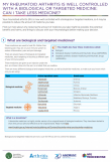Infliximab is used to treat some types of autoimmune conditions. These are conditions in which your body's defence (immune) system attacks healthy tissues, such as rheumatoid arthritis, psoriatic arthritis, ankylosing spondylitis, bowel diseases such as Crohn's disease, ulcerative colitis and skin diseases such as chronic plaque psoriasis.
Infliximab is usually used when other treatments haven't worked well. It's a type of medicine called a TNF inhibitor. It works by blocking natural inflammatory substances in your body called tumour necrosis factor-alpha (TNFa). This helps to reduce swelling (inflammation) and weaken your over-active immune system, thereby slowing or stopping the damage from the disease.
Watch this video about infliximab
(RheumInfo, Canada, 2011)









